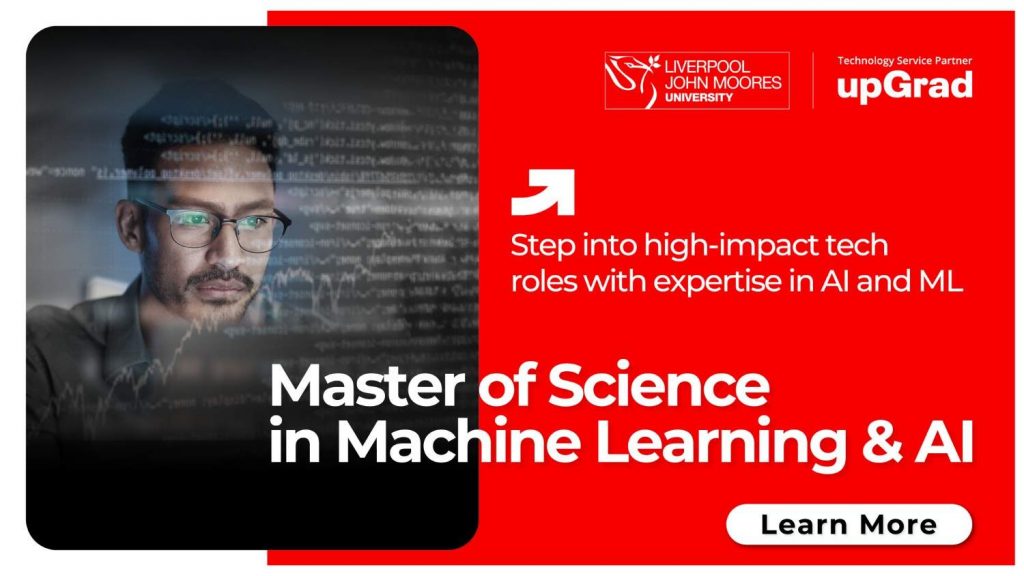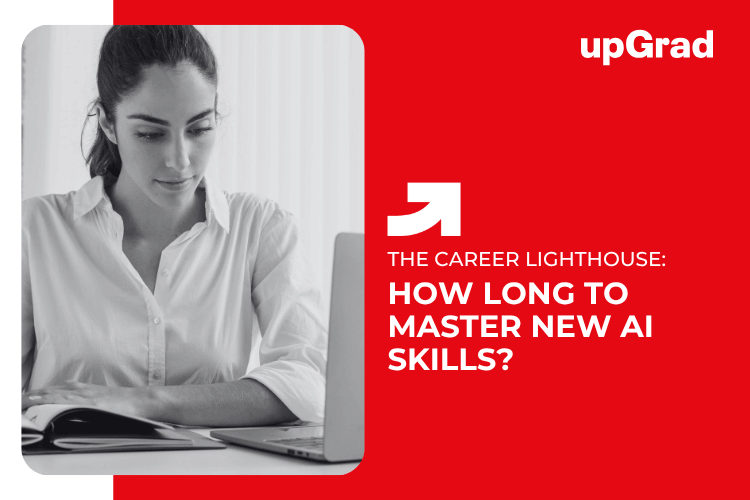The question of ‘how long does it take to learn AI’ is more relevant than ever as demand for skilled professionals skyrockets. According to Gartner’s 2024 Report, AI adoption in businesses has grown by 250% over the past four years, creating massive opportunities across industries. But how long it takes to learn AI depends on your starting point, learning style, and goals.
This blog unpacks realistic timelines and tips to help you navigate your AI learning journey with clarity and confidence. Whether you’re a complete beginner or looking to deepen your expertise, understanding the time investment involved is key to setting achievable milestones and staying motivated throughout your AI journey.
Take your skills to the next level — Explore AI & ML Certification Online
How Long Does It Take to Learn AI for Different Career Paths?
The timeline for how to learn artificial intelligence varies widely based on your background, learning style, and career goals. Understanding your starting point helps create a personalized AI roadmap to success. Below is a realistic guide on how long it may take to master AI skills for different learner profiles.
| Job Position | Average Annual Salary |
| Management Consultant | $183,000 |
| Product Manager | $196,000 |
| Financial Manager/Analyst | $102,857 |
| Marketing Manager | $115,000 |
| Healthcare Administrator | $110,000 |
| Strategy Consultant | $100,769 |
| Operations Manager | $86,307 |
| Business Development Manager | $87,606 |
| ESG/Sustainability Manager | $150,000 |
| Supply Chain Manager | $79,800 |
Beginner (Non-Tech Background)
If you’re starting with little to no technical knowledge, learning in AI will require foundational skills in programming, math, and statistics. To understand AI from scratch, beginners typically need 12 to 18 months of consistent study.
Also Read: 5 Practical Steps for Self-Learners in Singapore
Intermediate (Some Coding/Math Skills)
For learners with basic coding or math experience, learning about artificial intelligence becomes more focused on core AI concepts, such as machine learning and data processing. This group can expect to gain proficiency within 6 to 12 months by leveraging their existing skills and diving deeper into algorithms and models, accelerating their learning path efficiently.
Experienced Professional (Tech/Math)
Professionals with strong technical backgrounds can fast-track their AI learning, mastering advanced topics and practical applications in as little as 3 to 6 months. This stage emphasizes applying skills to real-world problems, making it ideal for those who already have a solid understanding of programming and the mathematical principles involved in AI.
Also Read: The Role of AI in Business Strategy for Singapore Professionals

Career Switcher with Full-Time Focus
Career switchers dedicating themselves full-time can expect to learn AI in 6 to 9 months by following an intensive AI roadmap. Immersive learning environments, bootcamps, and industry projects help accelerate skill acquisition, making it possible to transition careers effectively within a shorter timeframe.
Also Read: Top AI Project Ideas for Beginners in Singapore
Working Professional (Part-Time Study)
Balancing a full-time job while learning in AI requires flexible schedules and part-time study, often extending the learning duration to 12 to 24 months. This approach allows steady progress without burnout, making it manageable to learn AI while meeting professional responsibilities. Consistency and effective time management are key here.
Also Read: Getting Started with Generative AI: Best Practices for Working Professionals
Factors Influencing Your AI Learning Timeline
Understanding how to learn artificial intelligence effectively depends on several key factors. Whether you’re trying to learn AI from scratch or building on existing knowledge, your progress can vary. Here’s what impacts your AI roadmap:
- Prior Knowledge: A background in math or coding speeds up learning in AI.
- Learning Methods: Self-study vs. structured courses affect how you learn AI.
- Resources Available: Access to tools, mentors, and platforms influences success.
- Time Commitment: More consistent learning hours lead to faster mastery.
- Motivation and Goals: Clear objectives help you stay focused while you learn AI.
Also Read: How Learning Generative AI Closes the Skills Gap
AI Skill Roadmap (Beginner to Advanced)
Start small, master the basics, and level up gradually with this simple roadmap. Each stage builds your confidence and brings you closer to real-world AI expertise. The table below will help you understand the step-by-step learning path for AI:
| Stage | Focus Areas | Goal |
| AI Foundations | Python, stats, algebra, and data handling. | Build strong coding and math basics. |
| Machine Learning (ML) | Regression, classification, and clustering. | Train and improve real-world ML models. |
| Deep Learning | Neural networks, CNNs, RNNs, and TensorFlow, | Work on image, audio, and video tasks. |
| NLP | Text cleaning, embeddings, and transformers (BERT, GPT), | Create apps that understand human language. |
Choosing How to Learn AI: Format Comparison
Your learning journey depends on your goals, budget, and time. The table below will help you compare popular study formats:
| Learning Format | Why It Works? | Watch Out For | Ideal Learners |
| Online Courses | Flexible, affordable, and learn anytime. | May lack live mentorship. | Beginners exploring how to learn AI from scratch. |
| Bootcamps | Hands-on, guided by experts, and real projects. | Fast-packed and intense. | Career changers seeking structured guidance. |
| University Degrees | Deep theory and research exposure. | Longer duration and higher fees. | Learners aiming for research or advanced careers. |
Essential Skills You Need to Learn AI
To truly understand how to learn AI, focus on developing:
- Coding Knowledge: Python, NumPy, pandas, TensorFlow, PyTorch
- Math & Statistics: Algebra, probability, calculus, and data visualization
- Data Handling: Cleaning, preprocessing, and feature engineering
- Core ML & DL Algorithms: Regression, decision trees, neural networks
- NLP Techniques: Tokenization, embeddings, large language models
- Practical Tools: Git, cloud computing, Docker, and basic MLOps
- Soft Skills: Problem-solving, ethical AI use, storytelling with data
These skills make your AI roadmap for beginners both practical and career-oriented.
Accelerate Your AI Learning Journey with upGrad
upGrad empowers you to master AI through a well-structured curriculum, hands-on industry projects, and personalized mentorship from experienced professionals. Designed for learners at all levels, the programs offer a seamless blend of theory and practical application, building real-world skills. With flexible online learning, expert guidance, and career support, you gain the confidence and competence to thrive in the evolving tech landscape. upGrad ensures your AI learning journey is focused, efficient, and impactful.
Also Read: Top AI Skills to Learn to Accelerate Your Career in Singapore
Explore these Artificial Intelligence courses through upGrad!
- Executive Diploma in Machine Learning and AI from IIT Bangalore
- Master of Science in Machine Learning & AI from Liverpool John Moores University
Related Articles
5 In-Demand Technical Skills in Singapore You Can Pick Up Through Courses
🎓 Explore Our Top-Rated Courses in Singapore
Take the next step in your career with industry-relevant online courses designed for working professionals in Singapore.
- DBA Courses in Singapore
- Data Science Courses in Singapore
- MBA Courses in Singapore
- Master of Education Courses in Singapore
- AI ML Courses in Singapore
- Digital Marketing Courses in Singapore
- Product Management Courses in Singapore
- Generative AI Courses in Singapore
FAQ on How Long Does It Take to Learn New AI Skills
Yes, you can start learning AI without a technical background. Many beginner-friendly courses cover the basics of programming, math, and machine learning concepts. With consistent effort and the right resources, anyone can establish a solid foundation and gradually progress into more advanced topics over time.
Yes, it’s entirely possible to learn AI while working full-time. Many online platforms offer flexible, self-paced courses that allow you to study during evenings or weekends. Setting a structured learning schedule and choosing courses with practical projects can help you stay consistent and apply your learning efficiently.
Having a degree can be helpful, but it is not mandatory to work in AI. Employers increasingly focus on skills, hands-on experience, and project portfolios. Completing certifications, bootcamps, or specialised online courses can demonstrate your capabilities and help you qualify for AI roles without a traditional degree.
After learning AI, you can explore roles such as data scientist, machine learning engineer, AI analyst, computer vision specialist, or NLP engineer.
Choosing the right AI specialization depends on your interests, career goals, and industry trends. For instance, if you enjoy language and communication, NLP may be a suitable fit for you.
AI helps professionals in IT, marketing, finance, healthcare, and HR automate tasks, analyze data faster, and make smarter business decisions, giving them a career edge.
The core skills include mathematics (linear algebra, probability, calculus), programming (Python, R, or Java), and an understanding of machine learning concepts.
It can seem complex at first, but anyone can pick it up with consistency and curiosity. Start with Python and small ML projects; that’s the best way to learn by doing.
To a limited extent, yes. There are no-code AI tools, but learning basic coding helps you go deeper. So if you’re serious about how to learn AI from scratch, learning Python is a great first step.








